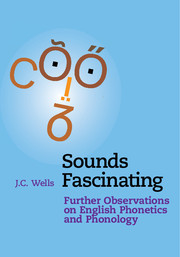6 - Places
from PART I - WORDS, NAMES, PEOPLE, AND PLACES
Published online by Cambridge University Press: 05 September 2016
Summary
Liverpool Suburbs
Non-Liverpudlians are sometimes flummoxed when confronted by the written name Maghull (a town or suburb located towards Ormskirk). They tend to think it might be ˈmæɡhʌl. But it isn't: it's məˈɡʌl, even though you might think that that sounds like some unfamiliar Scottish surname McGull.
Another suburb, not too far from Maghull, is Fazakerley. This may look exotic, but its etymology is Old English and its pronunciation straightforward: fəˈzækəli.
Quite close to Fazakerley is Kirkby, a place you might be tempted to pronounce with two ks: but no, there's just one, because it's ˈkɜːbi.
Ah, Aigburthˈeɡbəθ! Ah, Widnesˈwɪdnɪs!
An Unwritten Possessive
In Montserrat in the West Indies there is a village shown on the map as Frith. Yet everyone pronounces it frɪts. Why should this be? It certainly surprises outsiders.
Many place names in Montserrat are taken from the names of former sugar estates identified by the surname of the erstwhile owner: Blakes, Brades, Brodericks, Delvins, Drummonds, Dyers, Farrells, Gages, Geralds, Lees, Nixons, O'Garros, Sweeneys, Trants, Tuitts, Webbs, Whites. The names of these villages obviously consist of the surname plus the possessive -'s ending. Occasionally they are written with an apostrophe, though more often not. The name of the village of Molyneuxˈmɒlɪnjuːz conforms to the same pattern. Some names pronounced like possessives are nevertheless written without the -s ending. The village shown on maps as Farm is actually pronounced faːmz. Streatham is ˈstratəmz, which surprises people familiar with the London Streatham ˈstretəm. Omitting the possessive ending in writing is particularly usual in the case of stems ending in a sibilant. There are (or rather there were, before the volcano disaster of 1997) villages called Harris and Weekes. But they are generally pronounced ˈharɪsɪz, ˈwiːksɪz.
We would therefore expect the estate formerly belonging to Mr Frith to be called Frith(’)s. However in popular Caribbean English there is no θ: the fricative of BrE and AmE is replaced by a plosive t. Just as θɪŋ becomes tɪŋ, so frɪθ becomes frɪt. Add the possessive ending, and we have the actual pronunciation frɪts.
Spoken Caribbean creoles are generally pretty cavalier about the possessive ending: you often hear things like Mary mother for standard Mary's mother.
- Type
- Chapter
- Information
- Sounds FascinatingFurther Observations on English Phonetics and Phonology, pp. 43 - 51Publisher: Cambridge University PressPrint publication year: 2016

